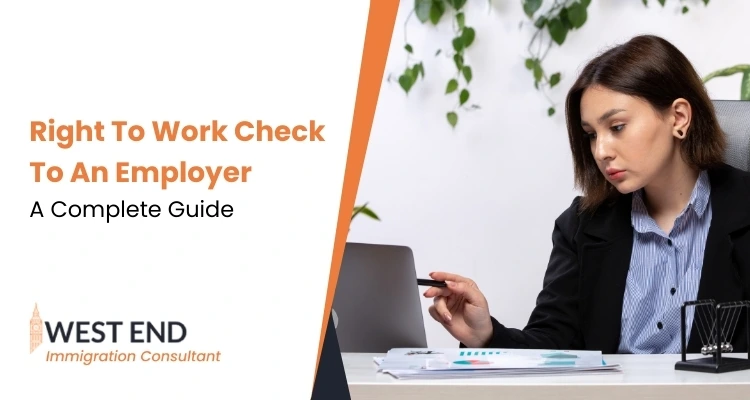
Skilled Worker Visa in 2024-25
December 17, 2024
OISC Renamed Immigration Advice Authority 2025: Complete Guide
January 22, 2025As suggested by the UK Visa and Immigration, if you are a UK employer, you must perform the ‘Right to Work Check’ on the employees to ensure they have the required right, or rather the permission to work in the country.
By doing so, you help to prevent illegal work in the UK and save from substantial penalties. Over time, the Right to Work Check has seen major reforms by the UKVI like various right to work check types as per the employee categories and stricter penalties for non-compliant UK employers.
To explain further, here is our complete guide on the Right to Work (RTW) Check for UK employers. We discuss the What is RTW check, its types and who needs it.
Let’s go ahead!
What is the Right to Work Check?
The Right to Work check refers to a verification check in the UK which is executed by UK Employers to ensure the authorisation of their employees to work in the UK. The right to work check is introduced in Sections 15 to 25 of the Immigration, Asylum, and Nationality Act 2006 UK. The rule is subsequently updated as per the Home Office guidance.
There are mainly two reasons why the right to work checks are all important. Firstly, it confirms the individual you’re hiring has the legal right to work in the UK. while secondly, it saves you from the later penalties if the employee is found guilty of not having permission to work in the UK.
Here is the list of employees who are compulsorily checked for the Right To Work (RTW) in the UK.
Who Needs the Right to Work Check?
- Permanent Employees who are hired on a long-term basis.
- Temporary and Seasonal Workers who are employed for short-term roles or seasonal tasks.
- Part-time workers, regardless of hours, have the same right to work checks as full-time employees.
- Casual Workers and Zero-Hours Contract Workers without guaranteed hours also be verified under the right to work.
- Contractors and Freelancers also may get the right to work check eligibility if work is controlled by the business.
- Volunteers and Unpaid Interns also comprise required right to work checks if they have contractual obligations.
- EU, EEA, and Swiss Citizens may require a valid visa or status under the EU Settlement Scheme.
- Student Visa Holders must be verified with work hour restrictions during their study term time.
- Seasonal Worker Visa holders like Seasonal Agricultural Workers must be checked.
- Sponsored Workers need verification of visa details and sponsorship conditions like rules on secondary employment, etc.
- Family Members of Migrants must be eligible for visa conditions.
- Refugees have the same work rights as UK citizens, but asylum petitioners may encounter restrictions, with specific regulations based on when and how permission was granted.
Types of Right to Work Checks
As a UK employer, you have four primary types for conducting Right to Work checks according to different circumstances and the immigration status of the employee:
1. Manual Document Check
The manual document check is one of the traditional types of right to work checks and review of the original documents.
In this method, first, you need to get the original documents that are required in the UKVI rules and then verify their authenticity in the employee’s presence and also copy and store the documents securely with mentioning the date of the check.
The manual document check is primarily suitable for your employees who provide you original physical documents to verify their right to work in the UK.
2. Online Right to Work Check
The Home Office also provides an online right to work check service to UK employers for verifying employees with biometric documents or digital immigration status.
In the online right to work check, you get a share code and date of birth from the employees and because you have access to the Home Office portal, you can verify the immigration status. This type of right to work check is mandatory for employees with biometric residence permits, EU Settlement Scheme statuses, or frontier worker permits.
3. Digital Verification via Identity Service Providers (IDSPs)
You can also use certified IDSPs to perform identity verification of your employees using ID validation technology.
All you need to do is activate a government-approved IDSP to check British and Irish citizens’ identity documents, get results via Identity Document Validation Technology (IDVT), and record evidence of the IDSP check for compliance of UKVI
The IDSP right to work check is utilised largely for British and Irish employees to verify their identity.
4. Employer Checking Service (ECS)
For cases where employees cannot provide documents or use the online service, employers can seek verification from the Home Office.
When the employees are not able to provide you with physical documents or cannot use the online right to work check service, you can also get the verification done from the Home Office.
Foremost, submit a request via the Home Office ECS online form and await a Positive Verification Notice (PVN), which serves as a statutory exception for six months.
As a UK employer, you can use the ECS for employees with pending Home Office applications, appeals, or undocumented rights like employees who arrived before 1989.
Why is the Right to Work Check Compulsory for UK Employers?
The Right to Check is compulsory for UK employers because it is a legal requirement in the UK as per the compliance of immigration laws of UKVI. Through the Right to Work Check, you can prevent illegal workers who lacks the legal right to work in the UK.
If UK employers fail the Right to Work Check and stay non-compliant with the legality of working in the UK, they may face severe consequences in their business legally, financially and reputationally.
Here are the key reasons why the right to work check is mandatory for UK employers:
1. Civil Penalties
You may face penalties of up to £60,000 for each illegal workers found by the Home Office, if you found liable then you will get the ‘civil penalty notice’ and you have to respond it in 28 days. The notice will explain how to make a payment, what steps to take next, and how to challenge the decision.
2. Criminal Liability
UK Employers who knowingly hire individuals without the right to work check could face criminal charges like unlimited fines and imprisonment.
3. Reputational Damage
If your business fails to comply with Right to Work laws, it will lead to a disappointing reputation, loss of customer trust and damage to your business relationships.
4. Operational Disruption
Non-compliance with the Right to Work check regulation also leads to business troubles like the loss of illegal workers and legal costs of the business.
5. Loss of Sponsor Licence
UK employers who sponsor workers may face suspension or revocation of their licence, and this can disrupt their business operations.
When the Right to Work Check must be performed?
Employers must conduct a Right to Work Check before employment begins to ensure compliance with UK laws and prevent employees who don’t have the legal right to work in the UK.
Here are key references when you must perform the Right to Work Check of your employees.
1. Pre-Employment
Before you issue a formal job offer, conduct their Right to Work Check and If you get to know, or have reasonable cause to believe, that the individual does not have the right to work in the UK, it will be illegal to hire them.
2. Document Verification
When you are verifying the original documents, ensure they are genuine, valid, and belong to the person presenting them.
3. Changes in Employment
You must conduct the Right to Work Check again if an employee’s visa or work permission is due to expire or if the nature of the employee’s role changes.
4. Sponsored Workers
If your sponsored worker gets the change in job role within the organisation, you are required to conduct a new Right to Work Check after UKVI approval for the role change.
How to Conduct the Right to Work Check?
From 1 October 2022, all UK businesses are required to carry out Right to Work Checks either in person or through an Identity Service Provider (IDSP). The method depends on factors such as the worker’s nationality, but as a UK employer, you do not have the choice to decide how an individual proves their right to work.
Here is the ideal process to conduct the right to work check:
1. Obtain Original Documents
Obtain the necessary documents whether the employee has a permanent or temporary right to work in the UK. Conduct the correct right to work checks before employment establishes a continuous statutory excuse for permanent workers to eliminate the need for further checks.
For temporary workers, proper checks offer a time-limited statutory excuse, requiring follow-up checks upon the expiry of their permission to stay.
The people with limited leave to remain, as of April 2022, conduct their Right to Work Checks through the Home Office's online service by using the applicant’s share code and date of birth.
You can also go with an Independent Service Provider for digital verification but must ensure the document's accuracy.
2. Check the Documents
Check the originality of the documents when the applicant is present, whether in person or via a live video call. In both cases, you must have the original documents, or the Home Office submitted documents of the employee with you. You cannot depend on seeing the document through a video call or looking at a faxed or scanned copy.
3. Retain a Copy of Records
Maintain a record of every document checked, including the employee's online profile page. This can be a hard copy or an unalterable scanned format, like JPEG or PDF. Keep the document copies securely for the entire duration of the employee's tenure and an additional two-year post-employment.
It's also important to note the date of the check, either by annotating the document or by maintaining a separate, secure record. Note the on the copy quoting “this right to work check was made on [date]”. Or note record the date in a separate manual or digital record.
How Westend Consultants Help You with Right to Work Checks in the UK?
Many UK employers find it difficult to stay in compliance with the complex UK laws and regulations regarding the Right to Work Checks for their potential employees. That’s not the case when our immigration lawyers are here to help.
At Westend Consultants, our qualified immigration lawyers in the UK help you ensure the Right to Work Checks in compliance with the UKVI rules. Our expertise in UK immigration law makes us one of the best immigration consultancy firms in the UK.
Get in touch to learn more!
Final Thought
Right to Work Check compliance is a continuous legal requirement for UK employers to prevent illegal working. You must implement consistent HR processes and stay up-to-date with the UK immigration regulations to ensure compliance.
Failure to comply with the Right to Work Check can result in investigations, fines, criminal charges, and damage to the reputation of your business. That’s why choosing the right immigration consultant is more suitable to ensure your compliance with the Home Office regulations regarding the right to work in the UK.
We, at Westend Consultants, assist UK employers in conducting accurate RTW checks on their employees and assure their legal alignment to the UK Right to Work laws.
Contact us to get started.


